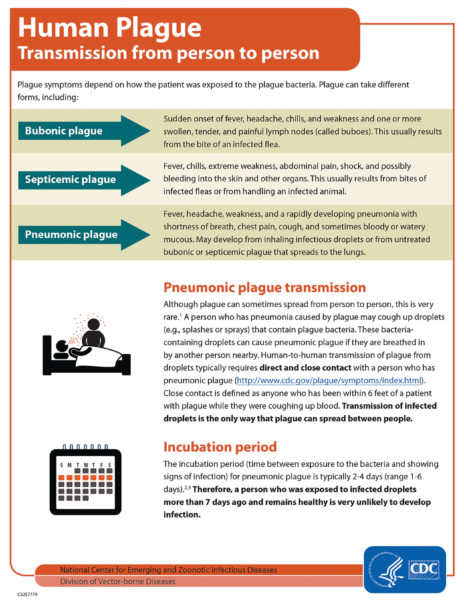Plague is a bacterial disease caused by, Yersinia pestis. Although rare, plague occurs throughout the western United States. Most human cases occur in New Mexico, Colorado, Arizona, and California. Plague is a very serious illness. Early diagnosis and treatment can ensure the best outcome.
How do people get plague?
- Bites of infected fleas.
- Touching or skinning infected animals (such as prairie dogs, squirrels, rats, and rabbits).
- Inhaling respiratory droplets from the cough of a person or animal (especially sick cats) infected with pneumonic plague.
What animals are known to spread plague to humans?
- Plague is sustained in a natural rodent-flea cycle.
- The most common animals that spread plague to humans in Colorado are rock squirrels, wood rats, and prairie dogs.
- Infected cats and dogs can spread the disease to people who handle them. Cats and dogs can develop symptoms similar to humans. It is rarer for a dog to show symptoms of a plague infection.
Plague in Humans
Human plague is often preceded by an outbreak or “epizootic” in which large numbers of susceptible rodents die. When this happens, hungry infected fleas leave the dead rodents and seek blood from other hosts, including humans and domestic pets. Studies suggest that in the southwestern U.S. epizootics are more likely to occur during cooler summers that follow wet winters.
Humans and domestic animals that are bitten by fleas from dead animals are at risk for contracting plague, especially during an epizootic. Cats usually become very ill from plague and can directly infect humans when they cough infectious droplets into the air. Dogs are less likely to be ill, but they can still bring plague-infected fleas into the home. In addition to flea bites, people can be exposed while handling skins or flesh of infected animals.
What are the symptoms of plague?
- Symptoms usually occur one to six days after being infected.
- Plague symptoms depend on how the person was exposed to the plague bacteria. The most common forms are bubonic, pneumonic, and septicemic.
- Bubonic plague is the most common form of plague. It usually occurs after the bite from an infected flea. The most common symptom is a swollen, painful lymph node, usually in the groin, armpit or neck. Other symptoms include fever, chills, headache, and extreme exhaustion. If it is not treated early, the bacteria can spread to other parts of the body and cause septicemic or pneumonic plague.
- Septicemic plague occurs when the bacteria multiply in the bloodstream. Symptoms can include high fever, exhaustion, light-headedness, and abdominal pain. This type of infection can quickly cause organ failure.
- Pneumonic plague is an infection in the lungs. Symptoms include high fever, chills, cough, difficulty breathing and coughing up bloody mucus. Pneumonic plague is almost always fatal is not treated rapidly.
What is the treatment for plague?
- Plague is a very serious illness but is treatable with antibiotics.
- The earlier a patient seeks medical care and receives treatment that is appropriate for plague, the better their chances are of a full recovery.
- Preventive antibiotic therapy may also be given in certain circumstances.
How do I keep my pets safe from plague?
- Treat pet dogs and cats for flea control regularly. Flea collars have not proven to be effective.
- Read labels carefully before applying flea control products to your pet.
- Keep pet food in rodent-proof containers.
- Monitor indoor/outdoor cats and dogs for signs of illness including high fever, tiredness, and swelling around the neck.
- Take sick pets to the veterinarian promptly. Be sure to mention possible exposures to plague such as hunting rodents or spending time outdoors near rodents.
- Do not allow your pets to roam freely.
- If your pet catches a rodent, treat your pet for fleas.
How do I protect myself and my family from plague?
- Cats and dogs can bring plague-infected fleas into the home.
- Do not allow dogs or cats that roam free to sleep on your bed.
- Monitor indoor/outdoor cats and dogs for signs of illness including high fever, tiredness, and swelling around the neck.
- Avoid contact with all rodents, dead or alive.
- Wear gloves when hunting, handling or skinning wildlife.
- Rodent-proof your home and outbuildings.
- Reduce rodent habitats around residential, work, and recreational areas. Remove brush, rock piles, junk, firewood, and possible food sources, such as pet and wild animal food.
- Use insect repellent to prevent flea bites.
If you develop symptoms of plague, see a health care provider immediately. Plague can be treated with antibiotics. Infected people must be treated promptly to avoid serious complications or death.


